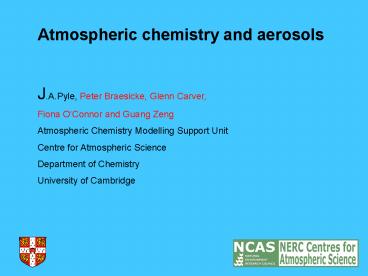Atmospheric chemistry and aerosols - PowerPoint PPT Presentation
1 / 44
Title:
Atmospheric chemistry and aerosols
Description:
Prospects for ESM with increasing computational capability. SPM 3 ... One-day advection using p-TOMCAT (T106L44) 1 S. E. S. S. S. E. A. Conclusions ... – PowerPoint PPT presentation
Number of Views:50
Avg rating:3.0/5.0
Title: Atmospheric chemistry and aerosols
1
Atmospheric chemistry and aerosols J.A.Pyle,
Peter Braesicke, Glenn Carver, Fiona OConnor
and Guang Zeng Atmospheric Chemistry Modelling
Support Unit Centre for Atmospheric
Science Department of Chemistry University of
Cambridge
2
- Atmospheric chemistry and the earth system
- Some modelling examples
- Prospects for ESM with increasing computational
capability
3
(No Transcript)
4
SPM 3
5
?Clx
?T
6
X
X
Climate models
Z
Complexity of treatment
Models of intermediate complexity
Interactions chemistry/physics/biology
atmosphere/ocean/surface/etc
7
Developing (components of) an Earth System Model
Some atmospheric chemistry examples Tropospheric
oxidizing capacity and air quality Some
preliminary results Some added interactions
(feedbacks) Stratospheric ozone Importance of
interactions Increased complexity of treatment
8
- Tropospheric studies using the Met Office Unified
Model - Composition changes in the past/future
- Will chemistry/climate interactions affect these
changes? - The Unified Model is a state-of-the art climate
model - We have added a (fairly) detailed chemistry
scheme for the troposphere - 46 species (Ox, HOx, NOx, CO/CH4/NMHC), 186
reactions (no halogens) - Surface emissions of NOx,NMHCs, etc are specified
(SRes A2).
9
- 5 Experiments
- Atmosphere of 2000 with current emissions, etc.
- Emissions of NOx, NMHCs, etc, for 2100 from IPCC
- but into a background 2000 atmosphere
- 2100 calculation with emissions as in B and an
atmosphere with 2xCO2 - In A-C the calculated O3 does not feedback onto
climate, i.e. feedback loop is not complete - D. 2000 atmosphere (as A) including O3 feedback
- E. 2100 atmosphere (as C) including O3 feedback
10
Schematic of the tropospheric ozone budget ??
Flux from stratosphere?? In situ chemistry RO2
NO ?RO NO2 NO2 h? ? NO O (O2) ? O3 O3 h?
? O2 O(1D) H2O O(1D) ? 2OH ?? Surface
deposition ??
11
The few model calculations so far suggest that
ozone should increase in experiment B (i.e. 2100
- 2000, just considering chemical fluxes). They
suggest a smaller ozone increase in expt C (i.e.
2100including climate change - 2000) BUT
..model budgets are very uncertain!! AND
..stratosphere usually a boundary condition
12
?O3 at surface (/ppbv) 2100-2000 (C-A)
Note large increases in ozone over continents
Some decreases over the oceans
13
?O3 (2100-2000)/ppbv
Emission changes only (B-A)
Plus climate change (C-A)
14
(No Transcript)
15
?O3 (ppbv) in 2100 between run C-B
Vertical transport
Transport and chemistry (lower T)
Increased STE
H2O-driven loss
16
Adding O3 feedback (expts D E) doesnt change
O3 much, but does change T - climate feedback?
17
Longterm dynamical changes can cause
stratospheric O3 variability and trends
18
Very unusual O3 hole in 2002
19
SH Wind/Ozone Scatter Plots for October
Observations
Unified Model
Largest dynamic range in model when O3 feedback
is included.
20
NH Scatter Plot
Full dynamic range requires variable SSTs
21
Model Validation with SONEX Data
CO
NOy
O3
Graphs courtesy of Dominik Brunner, ETHZ From
Marcus Koehler, Cambridge
22
One-day advection using TOMCAT (T42L31) 3
S
S
S
S
E
E
A
23
0.5
24
One-day advection using p-TOMCAT (T106L44) 1
E
S
S
S
E
A
S
25
- Conclusions
- Chemistry-climate interactions are important for
troposphere and stratosphere. - Air quality set to detriorate tropospheric
ozone to increase this century - Future changes in the lower stratosphere appear
to be very important - but this is sensitivity
study and not final story. - O3 feedback to T looks important
- Exciting prospect for high resolution studies
26
(No Transcript)
27
Ozone vertical profiles
28
(No Transcript)
29
Model budgets from IPCC
30
?O3 from IPCC, various models
31
Ozone seasonal behaviour
32
Lower stratosphere cools by a few K - impact on
kinetics OH NO2 M ? faster OH HNO3 ?
faster Should reduce HOx, the main O3-destroyer
in the very low stratosphere
33
(No Transcript)
34
Tropospheric ozone budgets/Tg/yr
, production and destruction , tropospheric
burden in Tg
35
(No Transcript)
36
(No Transcript)
37
(No Transcript)
38
?O3 (2100-2000)/ppbv
(Contours emphasize stratosphere)
Increase in lower strat B-A
Larger increase in lower strat ? partly due to
-?T there in future climate C-A
39
(No Transcript)
40
(No Transcript)
41
(No Transcript)
42
(No Transcript)
43
Approx. observed ?T
Observed ?T consistent with changed ozone, CO2,
etc
44
X
Z
Complexity of treatment
Y
Interactions chemistry/physics/biology
atmosphere/ocean/surface/etc































